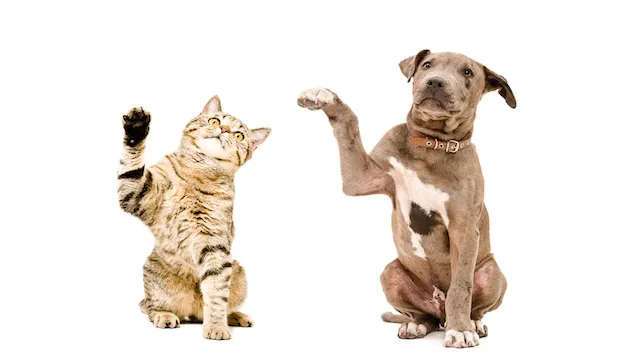Some people will do anything for their pets, but acupuncture? Is this part of a crazy new trend or just a modern application of a traditional alternative therapy for dogs and cats? Here’s the scoop on veterinary acupuncture: what it is and why it might be the best option for treating your pet.
Acupuncture for pets is similar to acupuncture treatments you may have received yourself. Veterinarians who have been trained in Traditional Chinese Veterinary Medicine (TCVM), and vets who practice TCVM can administer several traditional treatments including acupuncture, acupressure, food energy therapy and Chinese herbs alongside conventional Western treatments. If it sounds like complementary medicine for your pet, that’s exactly what it is.
According to Patrick Mahaney, VMD, acupuncture can help your dog or cat in several ways. Like acupuncture for humans, “veterinary acupuncture stimulates the release of the body’s own pain-relieving and anti-inflammatory substances.” Alternative health providers will often tell you that everything in the body is connected, so that stimulation at one point of the body can affect other parts. In this way, veterinary acupuncture can help muscles relax at the point of needle insertion as well as help with general pain relief beyond the insertion site.
Dr. Mahaney also states that acupuncture can improve blood flow to the body’s tissues while aiding the body in its natural process of eliminating metabolic waste. As a bonus, veterinary acupuncture doesn’t interact with medications or supplements, and won’t harm your pet’s internal organs like pain medications may.
What conditions can acupuncture treat?
From musculoskeletal problems like arthritis to skin and gastrointestinal conditions, veterinary acupuncture can be used to treat a number of functional problems. According to the International Veterinary Acupuncture Society (IVAS), the therapy can also treat the following:
- Traumatic nerve injury
- Intervertebral disk disease
- Respiratory problems
- Lick granulomas
- Allergic skin conditions
- Diarrhea
- Certain reproductive problems
- Sore backs in large animals
- Nonsurgical colic in large animals
That’s right, veterinary acupuncture isn’t just for small household pets. Some ranchers swear by acupuncture for cattle and horses.
How does acupuncture work?
Acupuncture works through a combination of three factors: “the point selected, the method of stimulation, and the duration of stimulation,” according to the IVAS. The 3,000-year-old traditional Chinese technique has been shown to be effective for the treatment of chronic pain and other conditions in human beings, and the same appears to be true for animals.

Other alternative therapies for pets
If you can’t imagine giving your pet a few acupuncture sessions, then there are other therapies to consider. Some veterinarians use herbal remedies instead of conventional pharmaceuticals to treat animals, while others use homeopathy as a form of treatment. At-home treatments include acupressure, massage and the topical use of therapeutic-grade oils.
Regardless of how you choose to help your pet heal from chronic pain or another condition, most pet owners agree that nothing is too good for their four-legged friends.
Has your pet ever received acupuncture?
—Megan Winkler
Megan Winkler is an author, historian, Neurosculpting® meditation coach, certified nutritional consultant and DIY diva. When she’s not writing or teaching a class, Megan can be found in the water, on a yoga mat, learning a new instrument or singing karaoke. Her passion for a healthy mind-body-spirit relationship motivates her to explore all the natural world has to offer.
Sources:
http://www.petmd.com/dog/wellness/evr_multi_veterinary-acupuncture-for-dogs-cats
https://www.ivas.org/about-ivas/what-is-veterinary-acupuncture
http://cim.ucsd.edu/clinical-care/acupuncture.shtml
http://pets.webmd.com/features/complementary-and-alternative-medicine-for-pets
